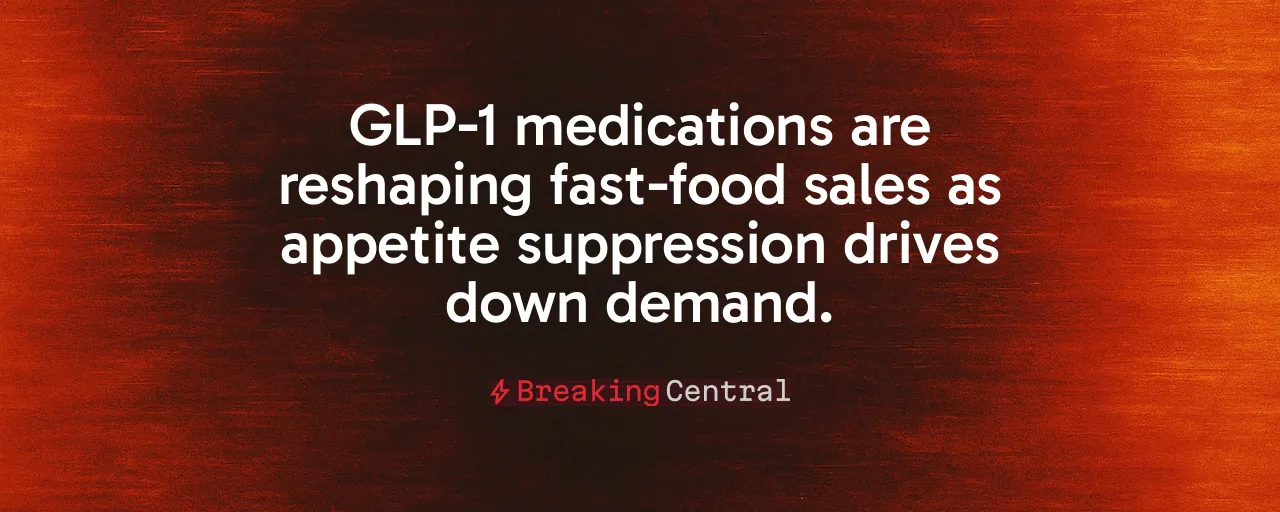Fast Food Faces a Reckoning
Fast-food giants like McDonald's, KFC, and Domino's are staring down a crisis. Analysts Chris Luyckx and Edward Lewis from Redburn Atlantic warn that GLP-1 medications, which curb appetite, will dent sales at these chains. With an estimated 7 million McDonald's customers using these drugs, the numbers are grim: a 0.9% sales drop for McDonald's, 1.2% for KFC, and 1.4% for Domino's. This shift signals a profound change in American eating habits, a significant market development.
GLP-1 drugs, initially developed for diabetes and obesity, are reshaping how people consume food. One in eight U.S. adults now uses these therapies, with projections of 24 million users by 2035. Users cut caloric intake by 20-30%, and grocery spending drops by 31%. Quick-service restaurants are losing customers and seeing smaller orders. The question is clear. Are we leaning too heavily on pills to solve problems better addressed through lifestyle changes?
Personal responsibility has long defined American values. Yet, the surge in GLP-1 use suggests a growing preference for pharmaceutical fixes over self-discipline. This trend forces a deeper look into whether we are tackling obesity's root causes or simply covering them up with medication.
Economic Waves and Fiscal Concerns
The economic impact is undeniable. Forecasts predict a $48 billion annual reduction in food spending over the next decade. Fast-food chains face shrinking basket sizes and fewer visits. Packaging companies are adapting to demand for smaller portions, while retailers emphasize nutrient-dense products tailored to GLP-1 users. McDonald's and its peers are racing to roll out healthier menus and competitive pricing, but the road ahead is tough.
From a fiscal standpoint, the stakes are high. The Congressional Budget Office projects that covering weight-loss drugs under Medicare could save $175-245 billion over ten years by lowering hospital costs. That figure grabs attention, yet it sidesteps a critical issue. Why should taxpayers fund treatments for conditions tied to personal choices? Public money deserves careful stewardship, and open-ended commitments are unacceptable.
Supporters of expanded drug coverage argue it promotes fairness, insisting that access to GLP-1 therapies narrows health disparities. That view misses the mark. Obesity involves medical factors, yet lifestyle, including diet, exercise, and accountability, plays a central role. Prioritizing prescriptions over behavior change risks fostering reliance on external solutions rather than empowering individuals.
A Call for Accountability
Advocates for limited government and personal initiative have consistently championed these principles. In 2006, the Medicare Prescription Drug Improvement and Modernization Act barred coverage for weight-loss drugs, affirming that individuals should bear responsibility for lifestyle-driven conditions. Now, as bipartisan proposals seek to reverse that ban, we face a pivotal choice: Will we unleash unchecked spending? The CBO flags significant cost increases if coverage expands without strict limits.
The food industry's response points to a better path. Facing sales declines, chains like Domino's are introducing high-protein, low-carb options and vibrant global flavors. These market-driven changes echo consumer demand for healthier convenience foods, a trend gaining steam since the early 2000s push for sustainable, plant-based meals. Individuals can follow suit by taking charge of their health without relying on costly drugs.
Some argue that restricting drug coverage overlooks obesity's complexity, citing trials showing GLP-1 benefits for heart failure and kidney disease. Those findings hold weight, yet they do not justify limitless spending. Policy must balance innovation with fiscal discipline, ensuring taxpayers aren't burdened by solutions that sideline personal effort.
Charting the Future
The GLP-1 surge is a moment of truth. Fast-food chains will evolve or falter, but the larger issue is whether Americans will take ownership of their health. In 2024, 54% of U.S. adults embraced structured eating patterns, and 7% plan to adopt plant-based diets in 2025. These choices prove that people can prioritize wellness without a doctor's script.
Policymakers must resist over-medicalizing obesity. GLP-1 drugs have value, yet they are not the complete answer. Expanding coverage without rigorous cost controls threatens deficits and undermines the principle that individuals should drive their own health outcomes.
This moment defines more than markets; it defines who we are. Will we empower people to make disciplined choices, or lean on government and pharmaceuticals to solve our challenges? The fast-food downturn offers a chance to recommit to accountability, innovation, and the values that keep America resilient.
